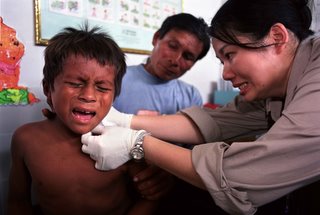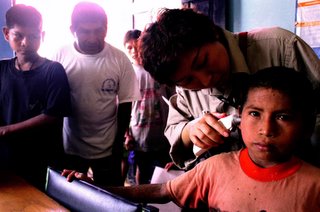Steaming heat, screaming children, and suspicious patients are not the norm in the Taiwan offices of these MDs.


Dentistry was by far the busiest area of the medical service. Most Aguaruan are rarely even within 50 miles of a dentist office. This not only created a heavy workload for the Root dentists, but also made it difficult to work on some of the younger patients, most of which became frightened by the mere sight of the instruments. Screaming children could be heard throughout the day. When the other doctors and nurses returned to the tool shop for lunch, the dentist and his assistant would remain at the hospital. At night they often ate their noodles cold because they had to remain at the hospital while they finished up their work. By the time they got to eat dinner the ‘pulled tooth bowl’ was overflowed with 12 hours worth of decayed teeth.
Medical work can often be intense and stressful. In the Amazon that stress is increased ten fold. Steaming heat. Screaming children. Suspicious natives. The doctors do not only feel this stress. The Root medical team had over 40 volunteers who literally took over a section of a village. They built a makeshift kitchen that cooked over 40 meals three times per day, took walks around the village, and took photos. During working hours they would sometimes see over 400 patients in one burning hot Amazonian day. This, in addition to the completely different cultures and customs of the doctors and patients inevitably led to some tension. Unaware of their past experience with previous groups of outsiders exploiting them with their High-tech cameras, the Root were unaware of the Aguaruna’s aversion to photography. This led to some embarrassment for the doctors when the village chief sent out a warning to the Root team stating that from now on “any pictures taken in the village must first be approved by me first”. Already suspicious of ‘outsiders’ the tension over the misunderstanding about photography caused some of the patients to be much more reserved and withdrawn during the medical service. This makes the doctor patient relationship a lot more difficult, especially when the doctor must ask questions regarding sexual relations or habits. When it came time for the doctors to leave the village of Huampami for another destination in Aguaruna territory it caused one of the more tense moments of the three-week medical service. Unaware that the Root was expected at a different village along a different river, a group of Huampami villagers became upset that the doctors had yet to see patients from some of the surrounding mountain areas. They were adamant. The doctors could not leave until the people from some of the more remote villages were given notice of the service and brought down from the mountains for treatment. The doctors tried to explain that it was impossible for them to treat everyone, but their response was only a warning that they could be prevented from leaving “by force if necessary”. Eventually a compromised was arranged with the wife of the village chief who got the group upset with the doctors to agree to let them go if they left a months supply of medicine for the town with their local doctor. The compromise was agreed to and within the next 3 hours the Root had loaded 32 crates, 40 beds, a portable kitchen, and over 40 backpacks onto their boats and were on their way to their next stop along the Rio Santiago.

0 Comments:
Post a Comment
<< Home